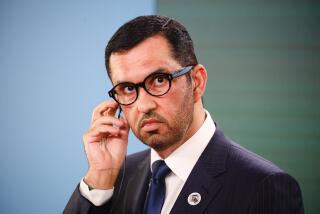Oil Executive Breaks With Industry
- Share via
WASHINGTON — Breaking with other oil industry leaders, a senior British Petroleum executive has acknowledged that scientists have reached a consensus about global warming and that to ignore concerns over climate change “would be unwise and potentially dangerous.”
John Browne, group chief executive of the British oil company, said that in tackling the issue of global warming--about which the oil industry has long expressed skepticism--it is time “for change and for a rethinking of corporate responsibility.”
Although the oil industry has long held that scientists have yet to prove a link between global warming and automobile emissions, Browne said a consensus has formed that is strong enough to persuade him of the need for action.
His remarks, in a speech Monday at Stanford University, drew a range of reaction from others in the oil industry. “He’s out of the church,” said one industry figure, speaking on condition of anonymity.
Ian Fowler, a spokesman for British Petroleum, ranked among the four largest oil firms, said that the remarks “will be pretty closely studied by the industry around the world.”
The executive vice president of the American Petroleum Institute, William O’Keefe, portrayed Browne’s speech as nothing out of the ordinary.
“Some characterize us as ‘just say no--don’t do anything’ ” about global warming, O’Keefe said. “That’s wrong.”
But he added: “There remains a high degree of uncertainty about what the effect is of increasing [gas] emissions.”
Within the environmental community, Browne’s comments were seen as a break as stunning as that which shook the tobacco industry two months ago when the Liggett Group acknowledged that smoking causes cancer and heart disease.
“The oil industry is now split over global warming, and that’s significant. They’re a powerful player,” said Dan Becker, a Sierra Club staff member who specializes in global warming and petroleum issues. “That’s pretty dramatic. They’re doing something, and they’re doing something in the right direction. One cheer for BP.”
Browne also suggested that his company sees the potential for profit in solar power and said the firm wants to invest heavily enough to reach $1 billion in sales within the next decade.
That focus alone sets the firm apart. The petroleum industry is skeptical about solar power, as was apparent Friday when Senate Majority Leader Trent Lott (R-Miss.) said at a meeting of the Independent Petroleum Assn. of America: “I’m sure you petroleum folks understand that solar power will solve all our problems. How much money have we blown on that? This is the hippies’ program from the ‘70s, and they’re still pushing this stuff.”
The debate over global warming--the trend toward higher temperatures across the surface of the Earth--has grown in intensity as study is piled upon study. The international Intergovernmental Panel on Climate Change concluded in 1995 that at least some of the global warming of the last century probably can be attributed to the burning of wood and fossil fuels--coal, oil and gas. They emit carbon dioxide, which traps heat much as the glass of a greenhouse traps solar energy.
The international study, more than five years in development, found that the average temperature around the world had increased about 1 degree Fahrenheit over the past 100 years and that it would climb between 1.8 degrees and 6.3 degrees over the next century if emissions were not reduced.
Browne acknowledged that there is no proven cause for global warming. But he said that “there is now an effective consensus among the world’s leading scientists and serious and well-informed people outside the scientific community that there is a discernible human influence on the climate and a link between the concentration of carbon dioxide and the increase in temperature.
“We must now focus on what can and what should be done, not because we can be certain climate change is happening but because the possibility can’t be ignored,” he said. “If we are all to take responsibility for the future of our planet, then it falls to us to begin to take precautionary action now.”
More to Read
Inside the business of entertainment
The Wide Shot brings you news, analysis and insights on everything from streaming wars to production — and what it all means for the future.
You may occasionally receive promotional content from the Los Angeles Times.










